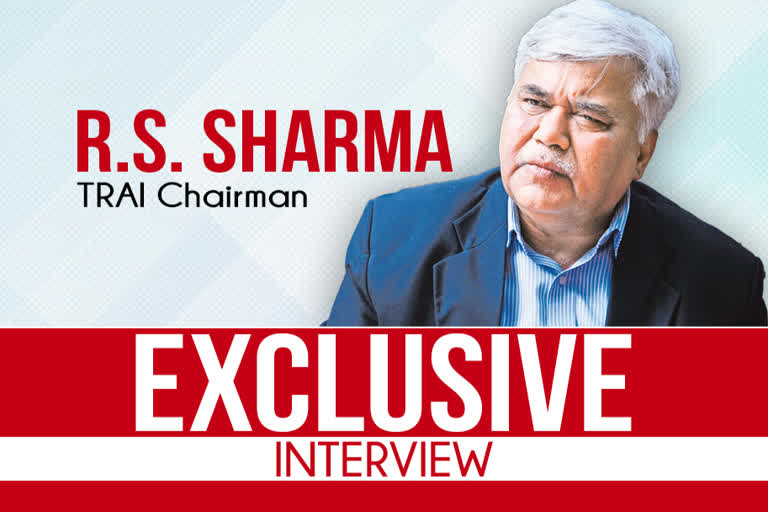New Delhi: Airtel and Vodafone Idea’s special plans that promised faster internet speed to a select few customers will likely impact the services of other customers as the bandwidth per BTS is fixed, says TRAI chairman R.S. Sharma in an exclusive interview with ETV Bharat. Speaking to ETV Bharat’s Gautam Debroy, R.S. Sharma also spoke about India’s dependence on imported telecom equipment saying that some countries initially dumped their electronics & telecom equipments in the country to kill the domestic industry so that they can raise the prices later.
Edited Excerpts:
Q: Do you believe that Bharti Airtel and Vodafone Idea’s plan of providing faster speeds to certain priority users may cause deterioration of services for other subscribers?
Prima facie, since bandwidth per BTS is fixed, any priority to a few customers is likely to impact the services of other common customers. It appears that the plans to provide priority to few select customers may adversely impact common customers.
Further, such plans have not clearly indicated the so called ‘faster speed’ to facilitate customers to make informed decision.
The matter is being examined in detail by the TRAI, and we will be able to reach to the conclusion based on our examination.
Q: Telecom being a sensitive sector, do you think that it’s necessary to promote domestic manufacturing of telecom equipment and digital sovereignty?
Few countries have purposefully adopted strategies to initially dump electronics items to kill our domestic industry, and then they raise the prices. We need to realize these tactics and should immediately implement the preferential market access policy.
I believe, that unless we provide more opportunities to our own domestic players, India will not succeed in local manufacturing.
TRAI has released its recommendation on "Promoting Local Telecom Equipment Manufacturing" on 3rd August 2018 to DOT. TRAI recommended that India should aim to achieve the objective of 'net zero imports of telecommunication equipment’ by 2022.
For this purpose, Telecom Equipment Manufacturing Council (TEMC), should identify and recommend specific areas of priorities.
A special Rs 1,000 crore fund should be created to promote research, innovation, standardization, design, testing, certification and manufacturing indigenous telecom equipment in the country.
I believe Government policies have paid rich dividends, but more needs to be done.
Q: Following BSNL’s approach not to use Chinese-made equipment in its upgradation, do you think that it is feasible to ban Chinese telecom equipment deployment?
I believe we can manufacture all telecom equipment needed by us in our country.
Government is giving all sorts of incentives to manufacture equipment in India and Indian companies should use this opportunity to develop technology and manufacture equipment within the country.
It is more about self-reliance in this critical area of high importance then about banning the deployment of Chinese equipment.
Q: What kind of response you did you get for the New Tariff Order for the broadcast industry?
The new regulatory framework is based on transparency, non-discrimination, protection of consumer interest and enabling orderly growth of the sector as its core principles. The new framework is consumer-centric, enabling them to transparently select and watch TV channels as per their choice.
The freedom of choice means a direct control of the consumer on his monthly bill for television services.
